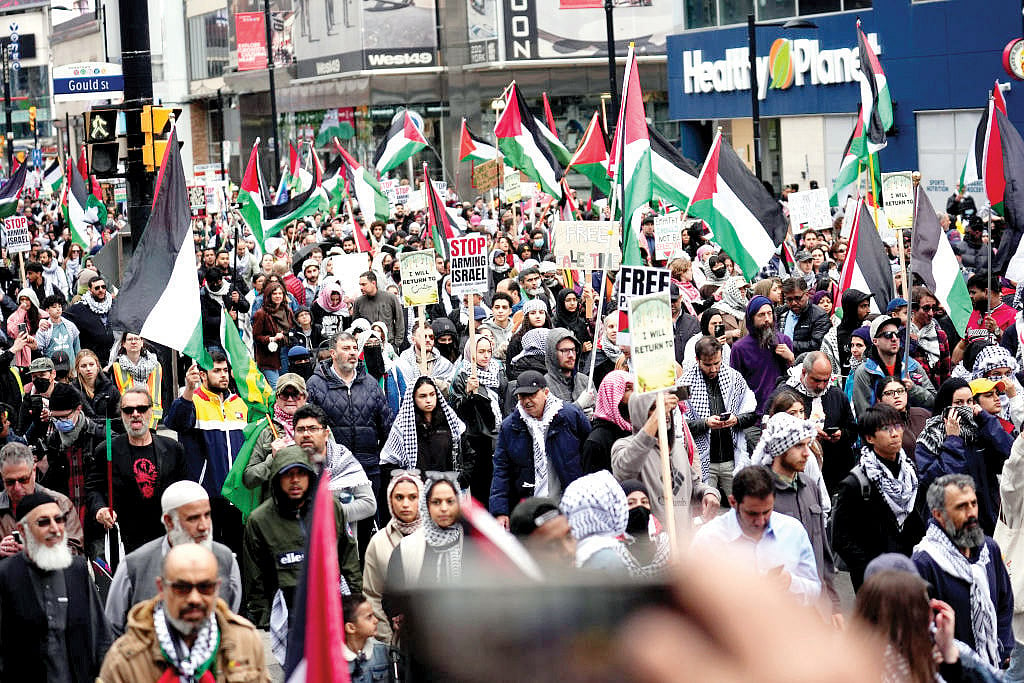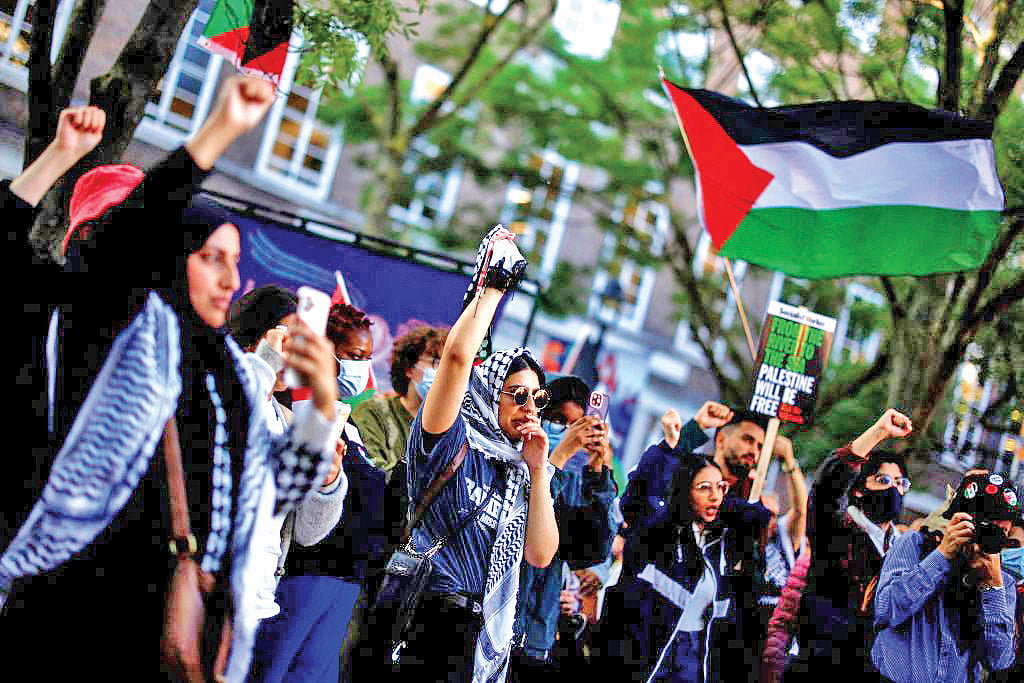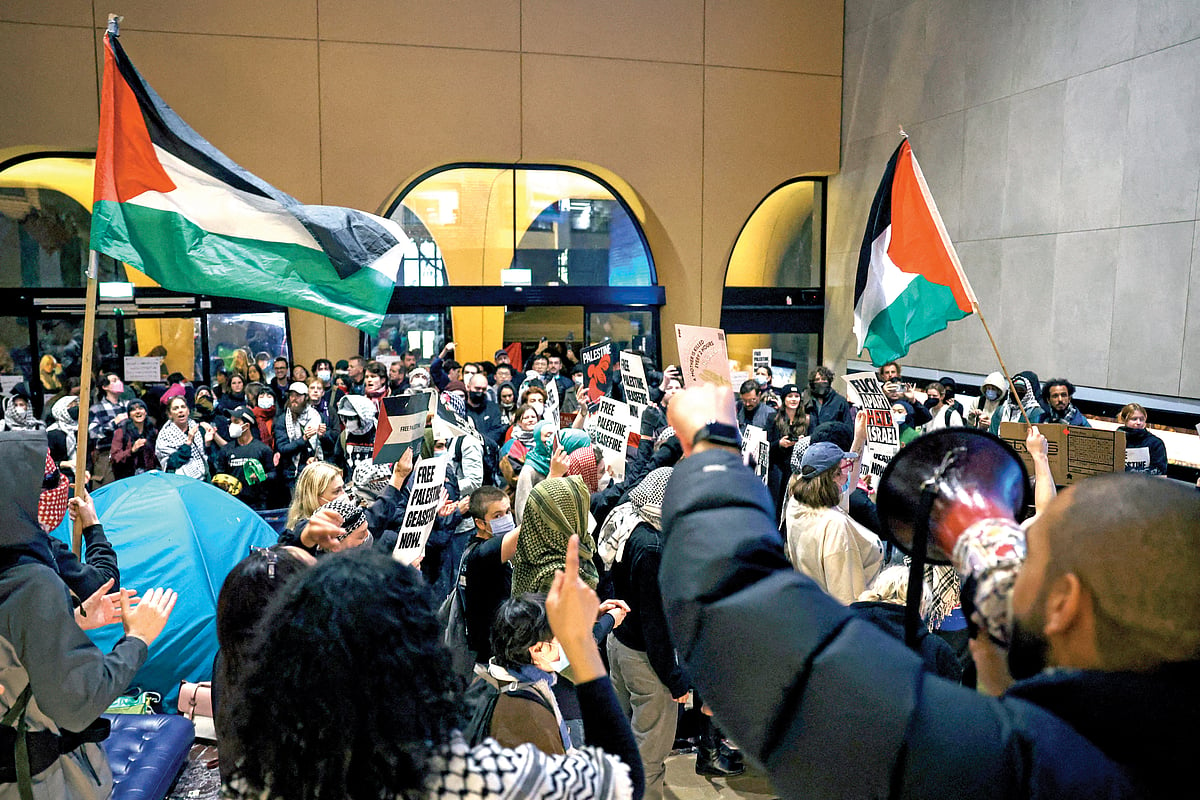The War on Gaza: What the global student outrage is really up against
While the campus protests have swelled and spread, the real enemy may be bigger than Israel — and far more insidious

The student movement against the brutal Israeli invasion of Gaza started with the first Gaza Solidarity Encampment at Columbia University, which saw more than a hundred demonstrators arrested on 18 April 2024.
On 23 April, Columbia students staged a walkout at the university campus in Washington DC and posted a call on social media for students of other universities: ‘We will seize our universities and force the administration to divest from any Israeli connections, for the people of Gaza! Join the popular university, take back our institutions.’
On 25 April, students at UCLA (University of California, Los Angeles) set up a Gaza Solidarity Encampment inside their university campus.
On 26 April, police dismantled the encampment, arresting 132 protesters and shooting at them with rubber bullets.
On the same day, students from Georgetown University and George Washington University established a joint encampment in response to the International Court of Justice’s ruling that Israel has violated the Genocide Convention set by the UN.
They were later joined by students from Howard University, George Mason University, University of Maryland and Baltimore.
On 28 April, clashes occurred between pro-Palestinian students chanting “second Nakba” (a reference to the expulsion of Palestinians from their homes by Israeli forces in 1948) and pro-Israeli students staging StandWithUs rallies.
It wasn’t long before students from many other colleges and universities, including Ivy League institutions—Harvard, MIT, Yale, Tufts, Boston, Emory, UNC–Capitol Hill, Brown, NYU, UPenn— joined the movement.
There has been global outrage among the youth against the Gaza genocide.
Demands include severing financial ties with Israel and its affiliated entities, transparency over financial ties and amnesty for protesters, as well as an end to US military support for Israel as part of the Boycott, Divestment and Sanction (BDS) movement.
While 14 universities in the UK saw students setting up encampments, Edinburgh University students went on hunger strike, like their counterparts in Princeton. As in the US, the methods adopted were civil disobedience, encampment and picketing.
In Amsterdam, as in the US, the riot police were called out.
French police, too, applied force to disperse student demonstrators at Sorbonne University.
As of 8 May, over 2,400 protesters have been arrested in the US, including faculty members and professors, with more than 30 protesters injured and hospitalised so far.
The Republican Party as a whole has vehemently criticised the movement as anti-Semitic, as have President Biden, former president Donald Trump, many US governors and, of course, Israeli prime minister Benjamin Netanyahu.
While many Democratic leaders are not sympathetic to the students’ movement, over 200 groups have expressed support for the protesters. Senator Bernie Sanders, leading Democrats and progressive members of Congress such as Alexandria Ocasio-Cortez, Ilhan Omar, Rashida Tlaib and Irvine mayor Farrah Khan have rallied behind the students.
Sanders told CNN, “I worry very much that President Biden is putting himself in a position where he has alienated not just young people but a lot of the Democratic base in terms of views on Israel and this war.”
Sanders drew comparisons with Vietnam, noting former president Lyndon Johnson’s decision not to run in 1968 amid growing anger over the war in Vietnam.
Just like the protesters of the 1960s and the 1980s (anti-apartheid in South Africa), today’s students are being arrested, suspended and expelled for showing solidarity with Palestinians.
The 54th anniversary of the ‘Kent State Massacre’ is also drawing unfortunate parallels. On 4 May 1970, the Ohio National Guard opened fire during anti-Vietnam demonstrations on the Kent State University campus, killing four students and unleashing a surge of protest across the country.
And while in terms of scale and motivation the campus protests over the past three weeks may seem much smaller, they could have a political fallout given the tight rematch between Biden and Trump.
America waged war directly with North Vietnam for five years, with nearly 1.9 million Americans drafted and more than 50,000 killed or missing in action. While no US troops are fighting in Israel’s war on Gaza, without its unconditional military and financial aid such an assault would not be possible.
The indiscriminate killing of civilians and the carpet-bombing of schools, hospitals, homes and infrastructure by Israel has rightly been termed genocide by the International Court of Law. Over 253 persons have been taken hostages, more than 80,000 injured and over 35,000 Palestinians killed—75 per cent of them women and children.
All these atrocities have swayed public opinion against Israel—support for Israel’s military assault dropped from 50 per cent in a November Gallup poll to 36 per cent in late March.
Senator Sanders commented that the US is actually waging a proxy war in Gaza and cannot avoid moral responsibility for the inhuman suffering inflicted on the civilians of Gaza by Israel.
President Biden, who in April signed a bill to provide $14 billion additional aid to Israel, has faced growing criticism over his handling of the crisis, with hundreds of thousands of voters casting ‘uncommitted ballots’ in Democratic primaries in recent months to express their frustration and anger.
“In 1968, one of the great failures of the party establishment was that they ignored anti-war youth and continued the horrific war in Vietnam and alienated young voters, and I feel like they’re at risk of doing the same thing,” said political strategist Abbas Alawieh.
It is hard to imagine university authorities agreeing to divest from companies that have direct business relations with Israel: Microsoft, Google, Amazon, Cisco, Lockheed Martin, Caterpillar, General Electric...
As for political parties, the Israeli lobby in America is very strong. The AIPAC (American Israel Public Affairs Committee), which advocates pro-Israel policies, is one of the biggest donors to the Democratic Party, and Joe Biden is very attached to them.
Yet one cannot overlook the role of public opinion in shifting policies and exerting political pressure.
For example, Evergreen State College in Olympia, Washington, reached a deal with students to work towards divesting from ‘companies that profit from gross Human Rights violation and/ or the occupation of Palestinian Territories’.
While demonstrations have spread to more than 154 campuses in 49 states, it’s still too soon tell what impact might be achieved before classes let out for summer. But one thing is clear: with Presidential elections less than six months away, Biden is rattled by the magnitude of the protests.
If the 'kids' have had some role in his freezing the shipment of arms and ammunition to Israel on the eve of Israel’s full-scale invasion of Rafah, it is no small victory.
Follow us on: Facebook, Twitter, Google News, Instagram
Join our official telegram channel (@nationalherald) and stay updated with the latest headlines




